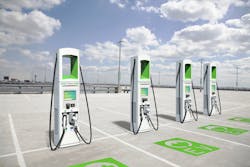U.S. Infrastructure Act investing $7.5B in National EV Charging Network, $65B for T&D buildout
The $1.2 trillion U.S. infrastructure bill finally passed by Congress last week and likely to be signed into law by President Biden early next week will allocate more than $70 billion toward energy projects decarbonizing the power and transportation sectors.
The bipartisan Infrastructure Investment and Jobs Act includes $65 billion which will be spent on both upgrading the nation’s transmission and distribution system to better more remote clean energy resources to electric demand centers such as cities.
Clean energy advocates are celebrating the legislative victory can help facilities greater adoption of wind, solar and energy storage. The latter two are key components of microgrid projects.
The upgrades also are intended to bolster a grid system which loses about $70 billion annually to power outages impacted by increasingly destructive weather events.
In addition, the Biden infrastructure package will invest more than $7 billion in electric vehicle charging infrastructure. The president wants to build a nationwide network for 500,000 EV chargers by 2030 to accelerate the adoption of electric vehicles, reduce emissions and create a new manufacturing sector.
“U.S. market share of plug-in EV sales is only one-third the size of the Chinese EV market,” the White House release says. “That needs to change.”
The IIJA also seeks to incentivize development of clean energy resources with tax credits and additional investment.
About the Author
EnergyTech Staff
Rod Walton is head of content for EnergyTech.com. He has spent 17 years covering the energy industry as a newspaper and trade journalist.
Walton formerly was energy writer and business editor at the Tulsa World. Later, he spent six years covering the electricity power sector for Pennwell and Clarion Events. He joined Endeavor and EnergyTech in November 2021.
He can be reached at [email protected].
EnergyTech is focused on the mission critical and large-scale energy users and their sustainability and resiliency goals. These include the commercial and industrial sectors, as well as the military, universities, data centers and microgrids.
Many large-scale energy users such as Fortune 500 companies, and mission-critical users such as military bases, universities, healthcare facilities, public safety and data centers, shifting their energy priorities to reach net-zero carbon goals within the coming decades. These include plans for renewable energy power purchase agreements, but also on-site resiliency projects such as microgrids, combined heat and power, rooftop solar, energy storage, digitalization and building efficiency upgrades.
